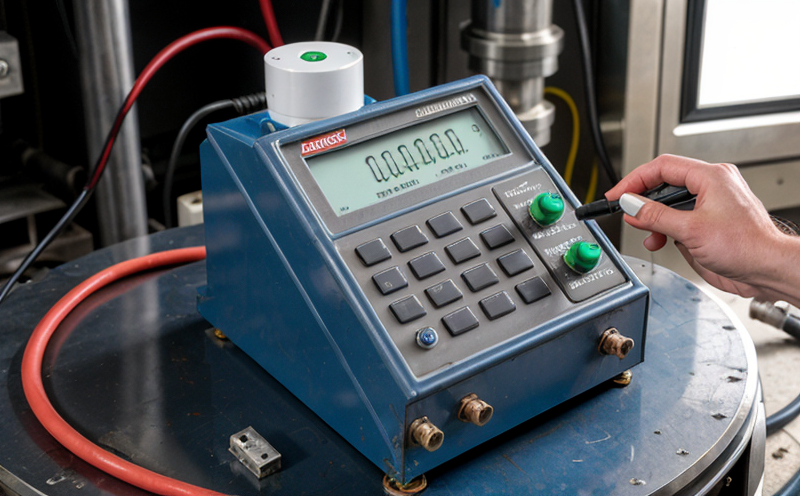Testing for reliability when the device is subjected to thermal cycling and rapid temperature changes
Testing for Reliability Withstanding the Unpredictable Temperature Changes
In todays fast-paced world of technology, devices are designed to perform optimally in a wide range of environments. However, temperature fluctuations can be detrimental to their performance and lifespan. Thats where Thermal Cycling and Rapid Temperature Change Testing comes into play a laboratory service provided by Eurolab that simulates real-world conditions to ensure your devices reliability.
What is Thermal Cycling and Rapid Temperature Change Testing?
Thermal cycling, also known as temperature cycling or thermal stress testing, involves subjecting electronic devices to repeated cycles of high and low temperatures. This process helps determine how well a device can withstand the physical stresses associated with temperature fluctuations. Rapid temperature changes occur when a device is exposed to extreme temperatures in a short period, which can cause damage to its internal components.
Thermal cycling and rapid temperature change testing are essential for businesses that develop electronic devices for various industries, including aerospace, automotive, medical, and consumer electronics. By simulating these conditions, manufacturers can ensure their products meet the required standards and regulations before they hit the market.
Advantages of Thermal Cycling and Rapid Temperature Change Testing
Eurolabs Thermal Cycling and Rapid Temperature Change Testing service offers numerous benefits to businesses
Predictive Maintenance Identify potential failures early on, reducing downtime and maintenance costs.
Improved Product Quality Ensure your products meet industry standards and regulations by testing them under realistic conditions.
Increased Efficiency Accelerate the product development cycle with faster test results, allowing you to bring your products to market sooner.
Cost Savings Avoid costly rework or redesign due to unforeseen thermal-related issues.
Enhanced Customer Satisfaction Deliver reliable products that meet customer expectations and reduce the risk of recalls.
Key Benefits
Accurate Results Eurolabs state-of-the-art equipment provides precise and repeatable test results.
Flexibility Customizable testing parameters to accommodate your specific product requirements.
Reliability Our experienced technicians ensure accurate testing and reliable results.
Compliance Meet industry standards and regulations with our testing services.
Thermal Cycling and Rapid Temperature Change Testing Process
Our thermal cycling and rapid temperature change testing process involves the following steps
Device Preparation Carefully prepare your device for testing by ensuring its properly packaged and connected to our test equipment.
Test Setup Our technicians set up the test parameters, including temperature ranges, ramp rates, and dwell times, according to your specifications.
Thermal Cycling Subject your device to repeated cycles of high and low temperatures, simulating real-world conditions.
Rapid Temperature Change Testing Expose your device to rapid temperature changes, inducing stress on its internal components.
Data Analysis Our experts analyze the test data, providing you with a detailed report on your products performance.
Frequently Asked Questions (FAQs)
What is the typical duration of thermal cycling and rapid temperature change testing?
The duration of testing varies depending on the devices complexity, temperature range, and test parameters. However, most tests can be completed within a few days to a week.
Can I customize the testing parameters for my product?
Yes, our services are tailored to meet your specific requirements. We work closely with you to determine the optimal test parameters for your device.
How accurate are the results provided by Eurolab?
Our state-of-the-art equipment and experienced technicians ensure precise and repeatable test results.
Conclusion
Thermal cycling and rapid temperature change testing is an essential service that helps businesses ensure their products can withstand real-world conditions. By partnering with Eurolab, you can accelerate your product development cycle, improve quality, and enhance customer satisfaction while reducing costs. Our expert technicians and state-of-the-art equipment provide accurate and reliable results, ensuring your devices meet industry standards and regulations.
Choose Eurolab for all your thermal cycling and rapid temperature change testing needs and discover a world of reliability and peace of mind.
-
Testing the physical durability of meters and measurement devices under mechanical stress
-
Verifying the robustness of devices when subjected to bumps, drops, and impacts
-
Assessing the device's ability to function correctly after being exposed to rough handling
-
Testing for physical damage, such as cracks or breakage, in the outer casing and display
-
Evaluating the resilience of moving parts and mechanical components in meters
-
Ensuring that the device maintains functionality under high-stress conditions
-
Assessing the long-term wear and tear of the device from repeated use
-
Testing devices designed for harsh industrial environments for shock resistance and durability
-
Verifying that the meter's housing can protect the internal components from damage
-
Testing for water ingress, dust, and foreign objects in the device casing
-
Verifying that buttons, knobs, or switches remain functional after extended mechanical stress
-
Evaluating the reliability of the device's connectors, cables, and ports over time
-
Assessing the durability of the display screen under mechanical forces like pressure or scratching
-
Ensuring that the device can withstand mechanical vibrations and rough transportation
-
Testing for degradation of the device casing due to exposure to chemicals or solvents
-
Evaluating the device's performance in real-world conditions, including physical shocks
-
Ensuring the mechanical design of the meter can withstand user errors or accidental misuse
-
Verifying the robustness of connectors and cables used in industrial applications
-
Assessing how well the meter withstands high-impact environments like construction sites
-
Ensuring the device can function without major damage when dropped or exposed to heavy impact
-
Evaluating the impact on the meter’s accuracy when subjected to significant physical stress




